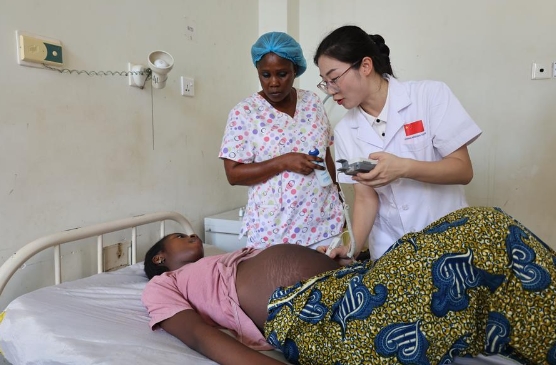China's medical, healthcare sector makes steady progress in 2023

China's medical and healthcare sector witnessed sound progress last year, with the major health indicators reaching the forefront among middle- and high-income countries, according to data released by the National Health Commission (NHC) on Wednesday.
As of 2023, China's infant mortality rate has dropped to 4.5 per 1,000, the mortality rate among children under five reached 6.2 per 1,000, and the maternal mortality rate decreased to 15.1 per 100,000, the NHC data shows.
IMPROVED ACCESSIBILITY
As China continues its drive to reform its medical system, efforts have been made to strengthen the accessibility of medical resources.
Following the construction of the 76 regional medical centers, the average rate of patients seeking treatment outside their region decreased by about 30 percent, NHC official Zhuang Ning told a press conference. Zhuang added that more than 90 percent of the patients opt to seek medical consultations for common and frequently-occurring diseases within their county.
China had also established over 18,000 medical consortia of various forms by the end of 2023 amid its efforts to improve community healthcare infrastructure and accessibility, NHC statistics show.
The number of two-way referrals between higher and lower-level medical institutions nationwide reached 30.32 million last year, marking a 9.7 percent increase compared to 2022.
NHC official Jiao Yahui said the government would proactively carry out pilot programs for setting up closely-knit urban medical groups in the future and continue to enhance the overall service capabilities of county-level hospitals.
Efforts would also be made to ensure that more quality medical resources are made available and evenly distributed among regions, she noted.
ENHANCED DAYCARE SERVICES
Amidst its efforts to boost the healthy growth of infants and kids, China now has approximately 100,000 nurseries for children under three, collectively capable of facilitating about 4.8 million such children, according to NHC official Yang Jinrui.
Yang added that to reduce the burden on parents, China has stepped up efforts to provide more families with universal daycare services for children under three in recent years, including establishing related vocational and undergraduate education programs.
Yang pledged that China would make more efforts to boost the development of universal daycare services for children under the age of three, enhance the quality of services, and improve the training system for those working in the sector.
TCM GAINS POPULARITY
Over the past year, traditional Chinese medicine (TCM) has experienced a growing surge in popularity, owing to its distinctive advantages in disease prevention.
Ouyang Bo, an official with the National Administration of Traditional Chinese Medicine, said that the total number of visits to TCM institutions in 2023 is estimated at 1.28 billion.
Ouyang said that more efforts will be made to enhance the capacity of and accessibility to TCM services, and to regulate the standards for TCM health preservation services.
Also at the press conference, it was revealed that a reporting system for infectious diseases and public health emergencies has been established, covering 84,000 healthcare institutions nationwide. The country also conducts routine monitoring of key infectious diseases including plague and polio.
Editor:伏娅敏
